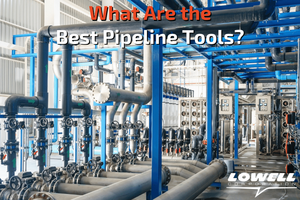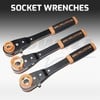Waterwork engineers and technicians rely on countless essential types of equipment in pipeline construction and development. Pipeline tools increase convenience for technicians and waterwork engineers while connecting sections of pipes, pumps, and valves during their complex projects.
Technicians find these tools handy when constructing fire hydrants, water treatment plants, public sewer systems, or as part of some maintenance project. In either case, waterworks engineers and oil and gas technicians are responsible for essential services that keep our infrastructure in working condition.
So, which waterworks tools and equipment do engineers use to handle such complex tasks? We compiled a list to help you navigate your options. These tools will simplify your workload and let you easily tackle challenging projects. Let’s dive into when, why, and how you should upgrade your pipeline tools.
What We’ll Cover:Engineers and technicians rely on essential pipeline tools despite high-tech tools and technology for several reasons. It’s important to watch out for common signs of wear and tear. If your toolkit shows signs of rust or resistance, you may be due for an upgrade.
Lowell pipeline tools have innovative features like Bolt-Thru configuration and multi-angle flexible handles. With these tools, there is no hassle while completing tasks.
Whether you’re performing water, oil, or gas pipeline work, we’ve got you covered. We can also assist you with hydrant maintenance and operation. You deserve to work with an American wrench manufacturer who can meet your needs.
How to Upgrade Your Pipeline ToolkitLowell pipeline tools are the best high-quality hand tools in the industry. Working in any pipeline construction zone requires the right pipeline tools to strike a perfect balance between cost and efficiency.
Together, an array of our efficient wrenches and waterwork tools can help you achieve high productivity and accessibility for pipeline development, procedure, and maintenance. You can rely on our pipeline tools for your upcoming projects to go smoothly.
As an American wrench manufacturer, we make it simple for our highly-valued customers to find their preferred tools from our online catalog. With all our tools in one place, finding the right strap wrenches, socket sets, and accessories is easier than ever. We ensure the right tools are available and ship anywhere in the U.S.
Top 10 Essential Pipeline WrenchesDuring a breakdown or malfunction, your big projects may halt. Even a minor error can result in a substantial loss. Therefore, it is best to maintain an essential pipeline toolkit. The best pipeline tools will help engineers and technicians perform everyday labor safely and efficiently.
Below are our top 10 recommendations for the essential pipeline hand tools you should carry into every work site.
In a demanding and heavy pipeline maintenance or construction project, pipe wrenches may come to your rescue. Pipe wrenches feature a high-tensile ductile iron handle. The configuration of its alloy steel parts can withstand most complex tasks with ease. Pipe wrenches also come in 45 45-degree offset style with a heavy-duty design to fulfill your most demanding requirements.
2) Chain WrenchesChain wrenches have vital applications in pipeline works. They allow smooth ratchet action with their dual reversible jaws in multiple directions without any requirement to remove the wrench from pipes.
3) Strap WrenchesIf you are working on a plastic pipe or a polished metallic pipe, strap wrenches may provide maximum power without leaving any blemishes, scratches, or deformities. Aluminum strap wrenches are another strap wrench that is light in weight but gives excellent gripping power.
4) Adjustable WrenchesFor ultimate precision, adjustable wrenches feature smooth jaws that help you work comfortably and give you the grip you need. Comfort grip is another adjustable wrench, thicker and more firm than other adjustable wrenches. It also reaps long-lasting grip and ergonomic benefits.
5) Torque WrenchesIf you want to apply a specific torque to a fastener, torque wrenches give you the recommended torque on no-hub soil connections and fitting clamps.
6) Socket Wrench SetsTwo socket wrench sets available might help you during pipeline operations: standard utility and metric socket sets. Standard utility socket sets assist engineers in tightening and loosening long flange bolts and repairing clamps or mechanical couplings. Meanwhile, metric socket sets render help while tightening and loosening nuts.
7) Ratchet Wrench HandlesThese ratchet wrench handles might feature traditional malleable iron or lower steel stamping that helps adjust the wrenches perfectly.
8) Square Drive Ratchet WrenchesSquare drive ratchet wrenches are perfect for ratcheting line-up clamps during welding steel pipes and other pipeline needs. The value line of these wrenches comes in two sizes. Select the preferred size and stamped and reversible ratchet head to increase flexibility.
9) 4-in-1 Ratchet WrenchesThe best 4-in-1 ratchet wrenches come in a dog bone shape to save your space. It features four socket sizes in a single handle to double the functionality.
10) Valve Wheel WrenchesValve Packing Wrenches feature a flexible wrench at one end and a circular valve wheel wrench at the other. These valve wheel wrenches increase functionality and flexibility.
4 Tips for Maintaining Your Pipeline ToolsNow that we’ve highlighted the best pipeline tools, let’s delve into maintaining them. Here’s how you can ensure your tools remain in optimal condition for years.
1) Read the Instruction ManualEvery tool boasts its unique features and maintenance needs. When you acquire a new piece of equipment, take the time to read its instruction manual thoroughly. This guide offers invaluable insights into cleaning procedures, storage recommendations, and potential wear-and-tear signs. Don’t just toss it in a drawer; keep it accessible. When maintenance time rolls around, this manual will be your go-to reference.
2) Use the Right Tool for the JobEnsuring longevity for your tools begins with proper usage. Each pipeline tool is designed for specific tasks. Using them for unintended purposes not only risks damage to the tool but can also jeopardize the quality of your work. For instance, don’t use a wrench as a hammer. By respecting each tool’s designated purpose, you reduce wear and increase its lifespan.
3) Inspect Your Toolkit RegularlyVigilance is the key to safety and efficiency. Before embarking on any task, take a moment to scrutinize each tool you plan to use. Look for signs of wear, damage, or malfunction. Ensure that moving parts are smooth and unhindered. By catching potential issues early on, you not only ensure a safer working environment but also avoid the costs associated with tool malfunctions or breakdowns.
4) Keep Them CleanYour tools, like any other piece of equipment, despise dirt and moisture. These elements can cause corrosion, reduce functionality, and compromise the tool’s structural integrity. After completing your tasks, allocate a few minutes to wipe down each tool. Use a soft cloth and appropriate cleaning solutions. Ensure they’re completely dry before storing them to prevent rust and deterioration. With consistent care and attention, you can maximize the efficiency and lifespan of your Lowell pipeline tools, ensuring top-notch performance every time.
Regarding pipeline tools, waterworks engineers and construction workers often focus on more expensive maintenance equipment — equipment like cameras, crawlers, cables, and cable reels. While diverse high-tech gadgets are essential, you shouldn’t take the trade’s basic tools for granted.
If the right tool isn’t available in a pinch, inspections can come to a screeching halt. The day could be a complete loss if your hands are tied and you aren’t able to open needed maintenance holes or perform minor repairs as quickly as possible.
Here are ten essential tools that every pipeline worker should use to safely and efficiently tackle a project:
1) Manhole HookPipe inspection is a necessary part of any pipeline construction. It’s an essential process for keeping your pipelines running smoothly and safely. There are many options for inspecting your pipes, but utility hole hooks have always been a standard solution among industry professionals.
2) SledgehammerMaintenance holes are a way for maintainers to access equipment in a safe and controlled manner. Whenever you drill, mill, or cut new maintenance holes into pipelines, the possibility of creating dust exists. Maintenance hole lids protect from this dust while workers complete work on sewer grates or other water systems.
However, these covers can become impossible to remove over time with just standard waterworks tools used for that purpose. Overhead swings with sledgehammers will effectively loosen the cap.
3) Gas MonitorHave you ever had a maintenance hole covered with dirt, grease, or oil? If the answer is yes, you know how easily it can be for workers to slip and fall while climbing over the cover. Many people sustained severe injuries by falling into a hole because they could not see where they were going due to obstruction from dirt and petroleum products.
Gas and methane can collect explosive levels below the lid of a utility hole. These gases may cause an explosion with just one spark from a simple tool like a hammer or wrench. In addition to this danger, workers may become overwhelmed by escaping gases during removal; therefore, you must take proper precautions.
4) Downhole Roller
The downhole roller tool is a powerful and versatile device that prevents damage to the cable. It also allows you to detect problems in your pipeline to deal with them before there are serious consequences. It is common to encounter a bend in the pipe at the invert of an underground tank. Alert your field crew to begin a more thorough inspection when this occurs.
5) Lowering RopeImagine that your tower crane is in an emergency and needs a new camera head. You’d need to hire a specialized company to do it for you in the old days since it’s a dangerous job. But with the proper lowering rope and the engineer’s skills (and some safety devices), it can safely place the camera at any required height (up to 300 meters).
6) Digging BarMaintenance holes are not always readily accessible. Often, they are buried under a layer of asphalt or a few inches of dirt. A digging bar will help workers break through these obstructions and uncover the maintenance hole lid. The tool’s lightweight design makes it easy to use.
7) Shovel
Clearing dirt around the opening is essential before removing a maintenance hole cover. When you remove the lid, the last thing you want is a mound of dirt pouring into the maintenance hole structure and onto the pipeline trough below. Shovels have many valuable functions, including uncovering buried maintenance holes and cleaning the maintenance hole ring before lid replacement.
8) FlashlightWorkers should look into a maintenance hole at the start of any pipeline inspection to determine flow and structural conditions. Because maintenance hole structures can be deep and dark, flashlights provide workers with the necessary light. With illumination, you can estimate the depth of the design and determine whether you need any special tools or equipment for entry. If a flashlight is unavailable, you can use a mirror to reflect sunlight into the maintenance hole directly.
9) ToolkitYou can guarantee one thing with pipeline tools – repairs. In one form or another, repairs need to happen regularly. Rather than limp back to the yard, you can perform most repairs in the field. A toolkit with tools that match the camera system can mean the difference between a productive day and a wasted day. We recommend inspecting the toolkit regularly to ensure the right socket sizes are available.
10) Electrical Repair KitHaving a well-stocked electrical kit handy will help keep equipment running. Whether checking the voltage continuity or performing minor repairs with a soldering iron, these tools can make a difference when it counts.
your pipeline tools?
To upgrade your pipeline toolkit, Lowell offers a comprehensive selection of tools and accessories, including pipe wrenches, chain wrenches, strap wrenches, adjustable wrenches, torque wrenches, socket wrench sets, ratchet wrench handles, square drive ratchet wrenches, 4-in-1 ratchet wrenches, and valve wheel wrenches. These tools are designed to withstand demanding tasks and enhance the productivity of pipeline construction, maintenance, and operation.
Maintaining pipeline tools is essential for their longevity, and four key tips include reading the instruction manual, using the right tool for the job, regularly inspecting the toolkit for defects, and keeping the tools clean and dry. Additionally, pipeline workers can benefit from essential accessories such as manhole hooks, sledgehammers, gas monitors, downhole rollers, lowering ropes, digging bars, shovels, flashlights, toolkits, and electrical repair kits.
By investing in high-quality American-made pipeline tools and accessories, engineers and technicians in the waterworks, oil, and gas industries can ensure their projects’ efficiency, safety, and completion. Lowell provides a reliable source for these tools through their online catalog, delivering the right tools anywhere in the U.S.
The Best American-Made Pipeline Tools Since 1869Lowell Corporation offers the best hand tools in the waterworks industry. Whether you need a strap wrench or a roller clutch, you’ll want the right balance between cost and efficiency. Our custom hand tools make tough jobs easier with waterworks engineers and lineman tools. With our essential pipeline and construction hand tools, you get the backing of the most trusted American wrench manufacturer in the hand tool industry.
Above all, Lowell Corporation is proud to manufacture all of its pipeline tools right here in the U.S.A. in the heart of New England. All Lowell wrenches are 100% guaranteed with our one-year manufacturer warranty against defects in material and craft for one year from delivery.
Make sure to follow us on Instagram for exciting product updates and promotions!












